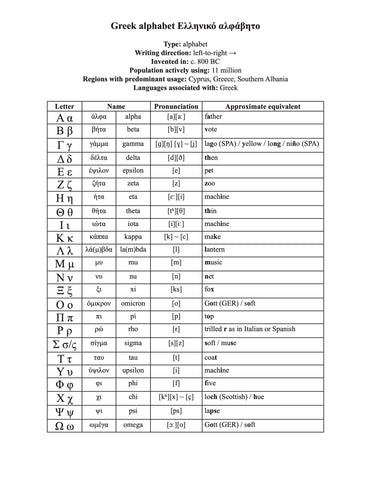The Magnificent Greek Script: Unraveling the Language of Gods and Scholars

Script type: The Greek script is an alphabet, comprising a set of characters representing individual sounds. It is one of the oldest and most influential writing systems in the world.
Writing direction: The Greek script is written from left to right, a standard direction followed by many modern scripts.
Creator and invention Time: The Greek script's invention is attributed to the Semitic-speaking Phoenicians, who adapted the script from the Egyptian hieroglyphics around the 9th century BCE. The Greeks further developed and modified it into the script we recognize today.
Time period of use: The Greek script has been in use for over 3,000 years. It originated during the Late Bronze Age and is still actively used today, making it one of the oldest continuously used writing systems.
Population and current usage: The Greek script is currently used by millions of people in Greece, Cyprus, and the Greek diaspora around the world. Additionally, it holds immense historical and cultural significance, being used in the liturgy of the Eastern Orthodox Church and classical studies.
Usage area: Geographically, the Greek script was historically used in the regions surrounding the Mediterranean Sea. It became the script for recording the Greek language, which was spoken throughout ancient Greece and the Hellenistic world.
Languages associated with the script: The Greek script is primarily associated with the Greek language, one of the earliest attested Indo-European languages. It has been instrumental in preserving the rich literary and philosophical heritage of ancient Greek civilization.
Interesting Facts:
- The Greek script was the first writing system to introduce vowels, a crucial innovation that facilitated accurate phonetic representation in written language.
- The Greeks were responsible for introducing the concept of vowels, consonants, and syllables, laying the foundation for modern phonetic alphabets.
- The Greek alphabet served as the basis for the development of other writing systems, including the Latin alphabet used in English and many other languages worldwide.
- The Greek script is associated with a wealth of historical texts, from the epics of Homer to the philosophical works of Plato and Aristotle, making it a treasure trove for scholars and literary enthusiasts.
- The Greek script played a vital role in the spread of knowledge and culture during the Hellenistic period, as Greek became the lingua franca of the eastern Mediterranean and beyond.
- The Greek script was used for a variety of writing materials, such as papyrus scrolls, parchment manuscripts, and later, printed books, showcasing its adaptability to changing technologies.
The Greek script is not only a testament to the ingenuity of the ancient Greeks but also a symbol of cultural resilience and endurance. From its humble beginnings in the Mediterranean region to its modern-day significance, the Greek script continues to be a source of pride for millions of people worldwide. Its timeless legacy serves as a bridge between the past and the present, connecting us to the great minds of antiquity and inspiring the pursuit of knowledge and wisdom for generations to come.

Practice Greek and other scripts with our book "100 Writing Systems of the World"!
Discover 100 diverse writing systems from around the globe in one captivating book. Practice writing different scripts with full character charts and essential information provided. Let your imagination soar on the blank right pages as you explore 43 abugidas, 33 alphabets, 14 abjads, 10 syllabaries, and 2 logographic scripts. Dive into numeral systems and even design your own writing system. Immerse yourself in the beauty and diversity of global scripts today with "100 Writing Systems of the World." Unleash your creativity and order now!